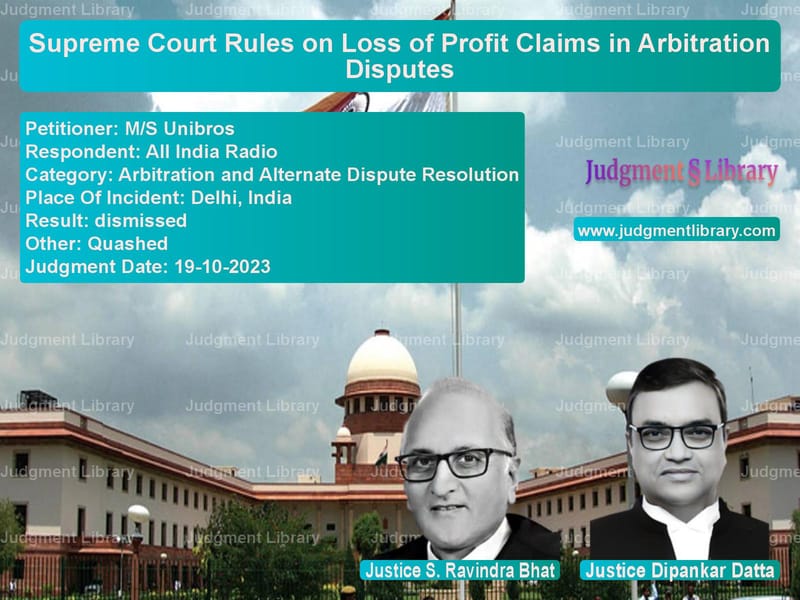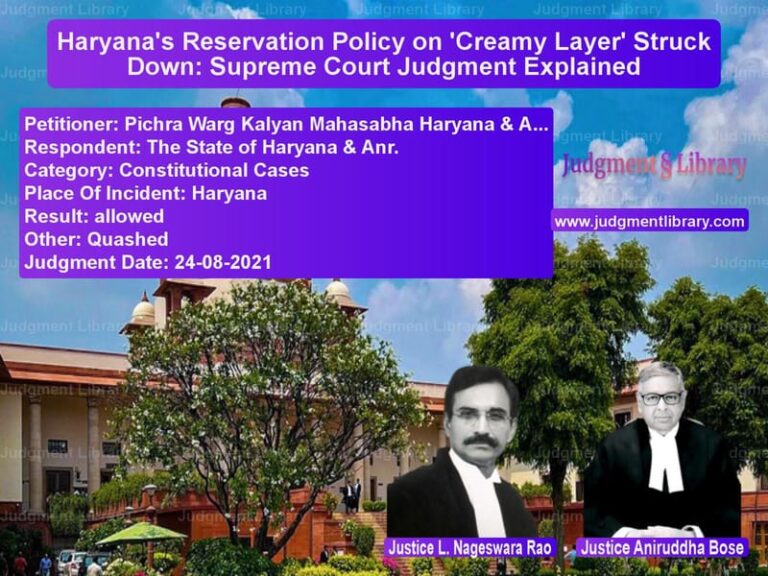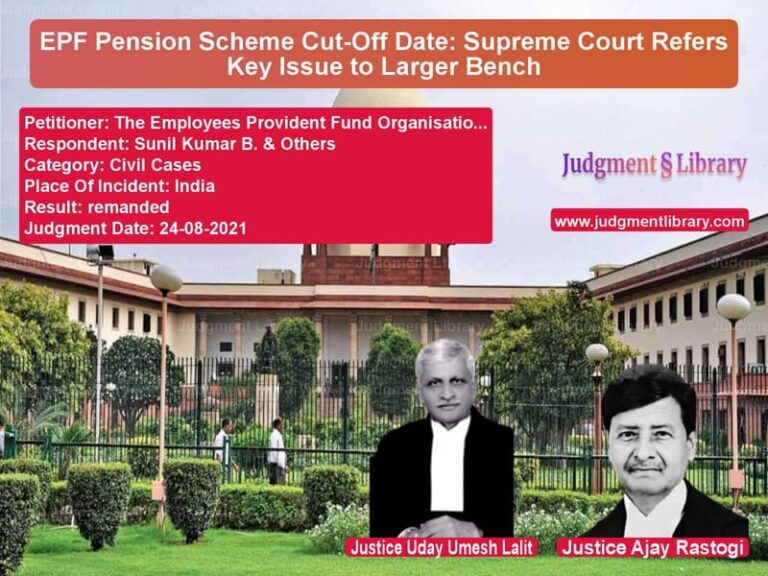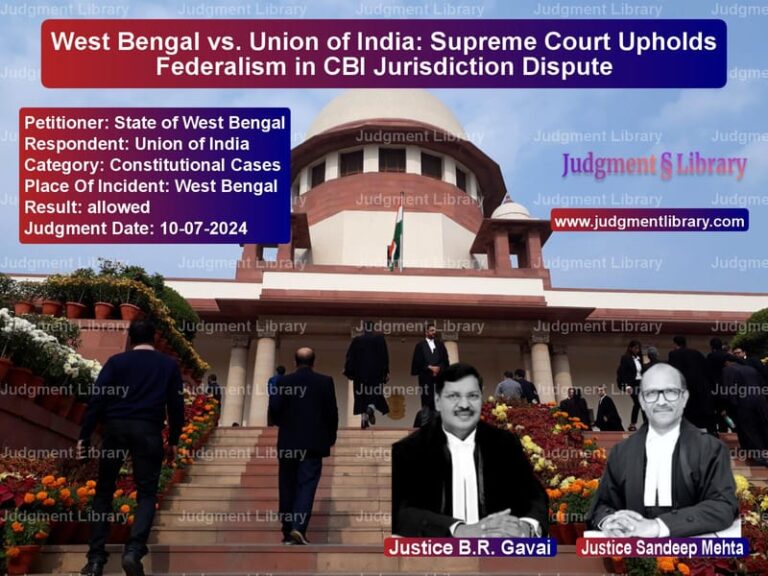Supreme Court Rules on Loss of Profit Claims in Arbitration Disputes
The Supreme Court of India has delivered a crucial judgment in the case of M/S Unibros vs. All India Radio, addressing the validity of loss of profit claims in arbitration disputes. The case arose from a construction contract between the appellant, M/S Unibros, and the respondent, All India Radio (AIR), for the construction of Delhi Doordarshan Bhawan at Mandi House, New Delhi. The dispute focused on delays in project completion and the subsequent arbitration award for loss of profit.
Background of the Case
The construction contract was awarded in 1990, with an expected completion period of one year. However, the project faced significant delays and was only completed in 1994, resulting in disputes over additional costs and compensation.
The appellant, Unibros, filed multiple claims, including:
- Claim for price escalation due to the extended project timeline.
- Claim for additional establishment and machinery costs.
- Claim for loss of profit due to extended project duration.
Arbitration Proceedings
The arbitration process resulted in an initial award in 1999, granting Unibros compensation for loss of profit under Claim No. 12, amounting to ₹1.44 crore. The award was challenged by AIR under Section 34 of the Arbitration and Conciliation Act, 1996, leading to the High Court setting aside the claim for loss of profit due to insufficient evidence.
The arbitrator was directed to reconsider the claim, and in 2002, a second arbitration award reaffirmed the compensation, leading to another challenge under Section 34. The High Court once again set aside the award, citing a lack of credible evidence.
Key Legal Issues
- Whether loss of profit claims can be awarded in arbitration based on Hudson’s formula without specific evidence.
- Whether the arbitrator exceeded jurisdiction by awarding damages without sufficient proof.
- Whether the public policy of India was violated by the arbitral award.
Arguments by the Petitioner (M/S Unibros)
The petitioner argued:
- The arbitrator’s decision was reasonable and based on well-established construction industry principles.
- Hudson’s formula, a widely accepted method for calculating loss of profit, was appropriately applied.
- The project delay was caused by the respondent, entitling them to compensation.
- Interference by courts under Section 34 should be limited to cases of patent illegality.
Arguments by the Respondent (All India Radio)
AIR countered:
- There was no direct evidence proving the loss of profit.
- Hudson’s formula cannot be used without demonstrating the contractor’s inability to take up other profitable contracts.
- The arbitrator failed to consider the rejection of other claims related to price escalation and additional costs.
- The award conflicted with the public policy of India as it lacked evidentiary support.
Supreme Court’s Observations
On the Application of Hudson’s Formula
The Court clarified that Hudson’s formula, while an accepted method for estimating loss of profit, cannot be applied in isolation without specific supporting evidence. The judgment stated:
“Hudson’s formula does not apply in a vacuum. It must be supported by credible evidence demonstrating the contractor’s loss of business opportunities due to the project delay.”
On the Burden of Proof
The Court reiterated that the burden of proof lies on the claimant:
“A claim for damages, whether general or special, cannot result in an award without proof of injury suffered. The arbitral award in question is patently illegal as it is based on no evidence.”
On Judicial Intervention in Arbitral Awards
The Court emphasized that while arbitral decisions should be respected, they must comply with legal principles:
“An arbitrator cannot grant damages solely based on assumptions or industry formulas without corroborative proof. The court has the authority to set aside awards that fail to meet this standard.”
Final Judgment
The Supreme Court upheld the High Court’s decision to set aside the arbitral award for loss of profit, ruling:
- The arbitral award violated public policy due to a lack of supporting evidence.
- Hudson’s formula was inapplicable without corroborative proof of lost business opportunities.
- The appellant’s claim for loss of profit was dismissed.
- The petition was dismissed with no further claims on the matter.
Impact of the Judgment
- Reinforces the importance of evidence in arbitration claims.
- Limits the scope of judicial interference while ensuring fairness.
- Clarifies the application of Hudson’s formula in Indian contract law.
- Sets a precedent for similar loss of profit disputes in construction contracts.
Conclusion
The Supreme Court’s ruling establishes that loss of profit claims in arbitration must be supported by direct evidence, not just theoretical calculations. The judgment ensures that arbitration remains a reliable dispute resolution mechanism while upholding legal standards of fairness and due process.
Petitioner Name: M/S Unibros.Respondent Name: All India Radio.Judgment By: Justice S. Ravindra Bhat, Justice Dipankar Datta.Place Of Incident: Delhi, India.Judgment Date: 19-10-2023.
Don’t miss out on the full details! Download the complete judgment in PDF format below and gain valuable insights instantly!
Download Judgment: ms-unibros-vs-all-india-radio-supreme-court-of-india-judgment-dated-19-10-2023.pdf
Directly Download Judgment: Directly download this Judgment
See all petitions in Arbitration Awards
See all petitions in Dispute Resolution Mechanisms
See all petitions in Enforcement of Awards
See all petitions in Commercial Arbitration
See all petitions in Settlement Agreements
See all petitions in Judgment by S Ravindra Bhat
See all petitions in Judgment by Dipankar Datta
See all petitions in dismissed
See all petitions in Quashed
See all petitions in supreme court of India judgments October 2023
See all petitions in 2023 judgments
See all posts in Arbitration and Alternate Dispute Resolution Category
See all allowed petitions in Arbitration and Alternate Dispute Resolution Category
See all Dismissed petitions in Arbitration and Alternate Dispute Resolution Category
See all partially allowed petitions in Arbitration and Alternate Dispute Resolution Category







